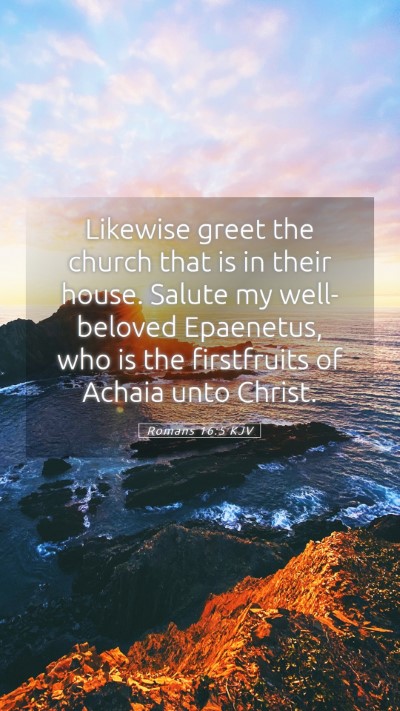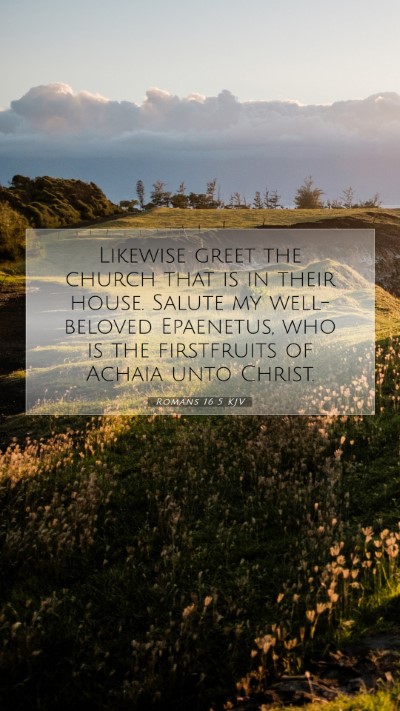Understanding Romans 16:5
Romans 16:5 states, "Likewise greet the church that is in their house. Greet my beloved Epaenetus, who is the firstfruits of Achaia unto Christ." This verse illustrates the early Church's practice of meeting in homes and acknowledges individuals who played significant roles in the faith community. Below, we delve into a comprehensive analysis of its meaning, drawing insights from notable public domain commentaries.
Bible Verse Meanings
The meaning of this verse encompasses themes of fellowship, gratitude, and the recognition of contributions within the community of believers. The mention of a specific individual, Epaenetus, emphasizes personal relationships in the faith.
Bible Verse Interpretations
-
Matthew Henry's Commentary:
Henry notes the importance of greeting fellow believers. The mention of a church in a house reflects the intimate and communal nature of early Christian gatherings, which were often held in private homes.
-
Albert Barnes' Commentary:
Barnes highlights Epaenetus as a significant figure, describing him as “the firstfruits of Achaia.” This illustrates not only his early conversion but also his influence in spreading the Gospel, serving as an example of faith in action.
-
Adam Clarke's Commentary:
Clarke emphasizes the affectionate language used by Paul in greeting Epaenetus and the church. This shows the deep bonds of love and community that characterized the early Church, reflecting a model for contemporary Christian relationships.
Bible Verse Understanding
This verse serves as a reminder of the importance of community in faith. The early church structure was heavily reliant on personal relationships and shared worship experiences, illustrating how integral these elements were to the strength of the Christian faith.
Bible Study Insights
-
The personal nature of greetings in the early church indicates that God’s family is built upon relationships.
-
The idea of a ‘church in their house’ suggests the necessity of making faith a part of everyday life, rather than a separate, formal entity.
-
By acknowledging Epaenetus, Paul showcases the role of individuals in advancing the Gospel and encourages believers to recognize and honor those among them who contribute to the community.
Bible Verse Commentary
Romans 16:5 encapsulates the spirit of early Christian fellowship. The verse stresses the importance of mutual encouragement among believers and the acknowledgment of those who lead and serve within the community. Reflecting on this verse encourages a deeper look into how individual believers can impact their communities positively.
Biblical Exegesis
Exegesis of Romans 16:5 involves examining the cultural context of the early church, where house gatherings were typical due to societal conditions that made larger public meetings challenging. Understanding this context helps modern readers appreciate the dynamic and flexible nature of early Christian worship.
Cross References
- Romans 12:10 - "Be kindly affectioned one to another with brotherly love; in honour preferring one another."
- 1 Corinthians 16:19 - "The churches of Asia salute you. Aquila and Priscilla salute you much in the Lord, with the church that is in their house."
- Colossians 4:15 - "Salute the brethren which are in Laodicea, and Nymphas, and the church which is in his house."
Application of Romans 16:5
Applying this verse to daily life entails fostering community, appreciating the contributions of others, and participating actively in fellowship with believers. It highlights the importance of personal connections and the encouragement that comes from recognizing the work of others in Christ.
Conclusion
Romans 16:5 invites readers to embrace a sense of community that is rooted in love, service, and mutual recognition. The insights derived from public domain commentaries enhance our understanding of this verse, equipping us with a more profound appreciation for its message within the larger narrative of the New Testament.


